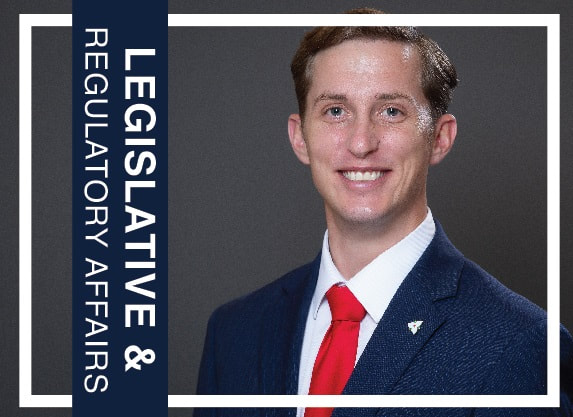|
by John Alexander, Director of Legislative & Regulatory Affairs
America’s Credit Unions unveils executive leadership team. Jim Nussle has unveiled his executive leadership team at our new national association, America’s Credit Unions, which officially launched on January 1. Nussle has a clear goal: push the credit union industry into the future with a unified voice that resonates from Washington, D.C., to Main Street. His team is tasked with a hefty goal – championing the interests of 140 million Americans who rely on credit unions. First and foremost, Jill Tomalin is ready to make waves as Executive Vice President. Then there’s Carrie Hunt, the new Chief Advocacy Officer; Anthony Demangone, the go-to guy for Membership & Engagement; Eddie Rivera, doubling as Chief Operating Officer & Chief Financial Officer; Meghan Burris Small, who will steer Communications & Marketing; and Todd Spiczenski, rounding it out as Chief Association Services Officer. This team isn’t just about titles – they’re about action, and they’re hitting the ground running. Nussle’s message is clear; they’re here to serve and propel credit unions forward, making sure members get the stability and service they deserve. Learn more about each of the executive team members here. Asset-size thresholds announced under Community Reinvestment Act regulations. The Board of Governors of the Federal Reserve System and the Federal Deposit Insurance Corporation (FDIC) have announced new asset-size thresholds for "small bank" and "intermediate small bank" classifications under the Community Reinvestment Act (CRA). These changes, effective from January 1, 2024, are part of an annual adjustment in line with the Consumer Price Index for Urban Wage Earners and Clerical Workers (CPI-W). The CRA, a key regulatory framework, encourages banks to meet the credit needs of their communities, particularly focusing on low- and moderate-income areas. The 2024 adjustments reflect a 4.06% increase in the CPI-W. A "small bank" is now defined as an institution with assets less than $1.564 billion, while an "intermediate small bank" is one with assets between $391 million and $1.564 billion. These thresholds are crucial as they determine the specific CRA examination procedures banks undergo. The Federal Reserve and FDIC's decision to adjust these thresholds annually ensures the CRA's relevance in changing economic landscapes. Further updates, as outlined in the agencies' October 2023 joint final rule, are set to apply from January 1, 2026. Beneficial ownership information registry now accepting reports. In a significant move to enhance financial transparency, the Financial Crimes Enforcement Network (FinCEN) of the U.S. Department of the Treasury has begun accepting beneficial ownership information (BOI) reports, as of January 1, 2024. This development is part of the enforcement of the Corporate Transparency Act, passed in 2021, aimed at curbing illicit finance by requiring companies operating in the U.S. to disclose the identities of their ultimate owners and controllers. The reporting process is designed to be straightforward, secure, and free of charge. Existing companies, those established or registered before January 1, 2024, are given until January 1, 2025, to file their reports. New companies, created or registered in the U.S. in 2024, have a 90-day window post-registration to comply. The reports aren't an annual obligation but are required whenever there's a need to update or correct previously submitted information. The data required includes each beneficial owner's name, date of birth, address, and an identifying number from a valid document like a driver's license or passport. Companies are also required to provide their details, including names and addresses, and for those formed after January 1, 2024, information about the individuals who established the company is needed as well. FinCEN issues final rule on access to beneficial ownership information. On December 20, the Financial Crimes Enforcement Network (FinCEN) released a final rule for BOI, as mandated by the Corporate Transparency Act (CTA). This rule establishes a BOI database where companies and legal entities are required to report their BOI directly to FinCEN. Additionally, financial institutions will be granted access to this database, enabling them to gather the essential information needed to fulfill their customer due diligence responsibilities. InfoSight: streamlining access to state laws for credit unions. Navigating the intricate web of state laws affecting credit unions, whether federally or state-chartered, just got easier with InfoSight. This member-exclusive platform stands out as a beacon of efficiency, offering direct access to relevant state legislation for all 50 states. Gone are the days of sifting through an overwhelming array of online resources. InfoSight consolidates the necessary legal information, enabling credit unions to remain compliant amidst the dynamic landscape of federal and state regulations. With InfoSight, credit unions can now save valuable time and focus on their core operations, assured that they are up-to-date with the latest legal requirements. InfoSight is a free benefit of your DakCU membership! Click here to learn more. As always, please don’t hesitate to contact me with any advocacy or regulatory concerns. Comments are closed.
|
The MemoThe Memo is DakCU's newsletter that keeps Want the Memo delivered straight to your inbox?
Archives
July 2024
Categories
All
|
|
Copyright Dakota Credit Union Association. All Rights Reserved.
2005 N Kavaney Dr - Suite 201 | Bismarck, North Dakota 58501 Phone: 800-279-6328 | [email protected] | sitemap | privacy policy |





